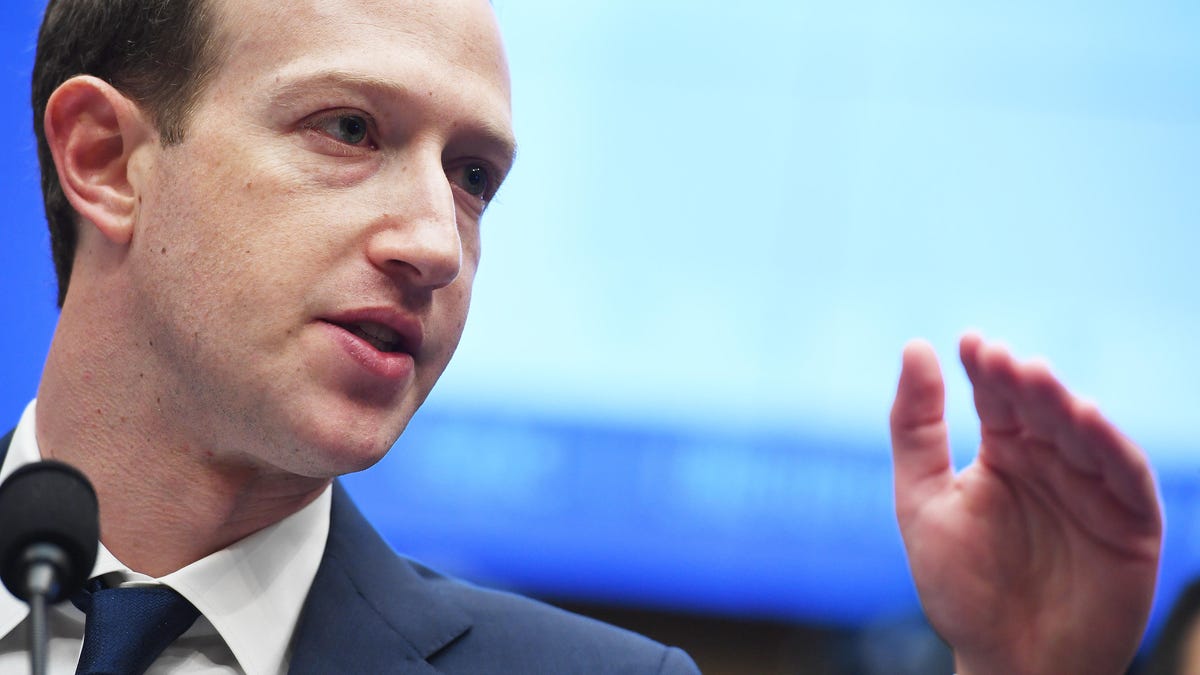Facebook's Mark Zuckerberg wants internet regulation... as long as he can shape it
The social network faces an uphill battle as it tries to regain the trust of lawmakers and its users.

Facebook CEO and co-founder Mark Zuckerberg appeared at a congressional hearing in Washington, DC in April 2018.
Facebook CEO Mark Zuckerberg hasn't been able to get ahead of the problems that plague his creation. So now he's trying to get ahead of regulation that might do the job he hasn't been able to.
Over the weekend, Zuckerberg called for government and regulators to play a "more active role" when it comes to harmful content, election integrity, privacy and data portability. Those are all issues Facebook hasn't been able to corral even as it ropes in more users.
His ideas, published in a Washington Post op-ed, illustrate how anxious Facebook is to get a seat at the table as lawmakers hash out potential legislation that will affect its core business. Facebook and its Silicon Valley peers haven't been the target of serious US regulation. But the landscape has shifted greatly since Zuckerberg in November 2016 said it was "crazy" to think fake news on Facebook affected the results of that year's US presidential election.
When he traveled to Capitol Hill a year ago, Zuckerberg took a conciliatory tone. He agreed "in principle" that regulation might be needed, but hesitated, saying "details matter." Still, scandal after scandal has hit the network. In the latest: a white terrorist used Facebook Live, a streaming video tool, to broadcast part of the murders of 50 Muslims in New Zealand.
"I'm glad to see that Mr. Zuckerberg is finally acknowledging what I've been saying for [the] past two years: the era of the social media Wild West is over," said Sen. Mark Warner, a Virginia Democrat, in a statement. "Facebook needs to work with Congress to pass effective legislative guardrails, recognizing that the largest platforms, like Facebook, are going to need to be subject to a higher level of regulation in keeping with their enormous power."
The US is well behind Europe when it comes to regulating technology companies. A year ago, the EU implemented a new data privacy law, the General Data Protection Regulation. The law changed the rules for companies that collect, store or process large amounts of information on residents of the EU. It requires more openness about what data the companies have and who they share it with.
California last year passed a strict data privacy law. That's significant because it's the largest state in the union and a trendsetter. But federal law trumps state law, which may be why Facebook is eager to address the issue.
'Regain the trust'
Still, Facebook faces an uphill battle. It has to get lawmakers, advocacy groups and other tech firms on board with its ideas. And it has to rebuild trust, which could be its biggest challenge. Airing some proposals, as Zuckerberg did in the Post, is a start, even if it will be lawmakers who have the final say.
"I think the most important thing is for Facebook to regain the trust of its users, the trust of legislators and the trust of fellow tech companies," said Gigi Sohn, a fellow at Georgetown Law's Institute for Technology Law & Policy and a former FCC lawyer.
Government regulation of the tech industry in the US has been proposed in the past, but hasn't gained much traction. Virginia's Warner was one of the lawmakers who introduced the Honest Ads Act, which would have required tech companies to disclose who political ads targeted and how much they cost.
Though Facebook supported the idea, the act hasn't been passed into law. The company, meanwhile, has rolled out its own political ad database and started requiring advertisers in some countries to verify their identity and addresses. But media outlets found loopholes in the tool and businesses complained that Facebook has misclassified their ads as political or related to an issue of national importance.
It's one of the areas where Facebook is calling for more guidance.
"Deciding whether an ad is political isn't always straightforward. Our systems would be more effective if regulation created common standards for verifying political actors," Zuckerberg said.
Some advocacy groups and government employees are also already raising concerns about government rules around what content companies should pull down.
Zuckerberg said in the op-ed that there need to be standards around how to deal with harmful content and "regulation could set baselines for what's prohibited."
Chris Calabrese, vice president of policy at the Center for Democracy and Technology, said he would worry about a "one-size-fits-all solution" for content. "There are lots of different platforms and types of voices and forums on the net," he said. "And we certainly don't want any kind of government institution picking or choosing how those forums regulate their content."
Axios reported on Monday that Zuckerberg will likely be returning to Washington to talk to lawmakers about the ideas he's proposed. A Facebook spokesperson said that may happen, but plans haven't been set yet.
Zuckerberg could get a chilly reception.
Rep. David Cicilline, a Rhode Island Democrat, said in a tweet over the weekend that Zuckerberg "doesn't get to make the rules anymore," adding that Facebook has shown "it cannot regulate itself."
The days where tech could do no wrong are also over.
"When it comes to both politics and public perception, the tech community has been wearing a halo for many years," said Dan Schnur, a professor at the University of Southern California's Annenberg School for Communication and Journalism, and a former Republican political consultant. "Now that halo's off and they're facing a much more adversarial challenge in Washington."

